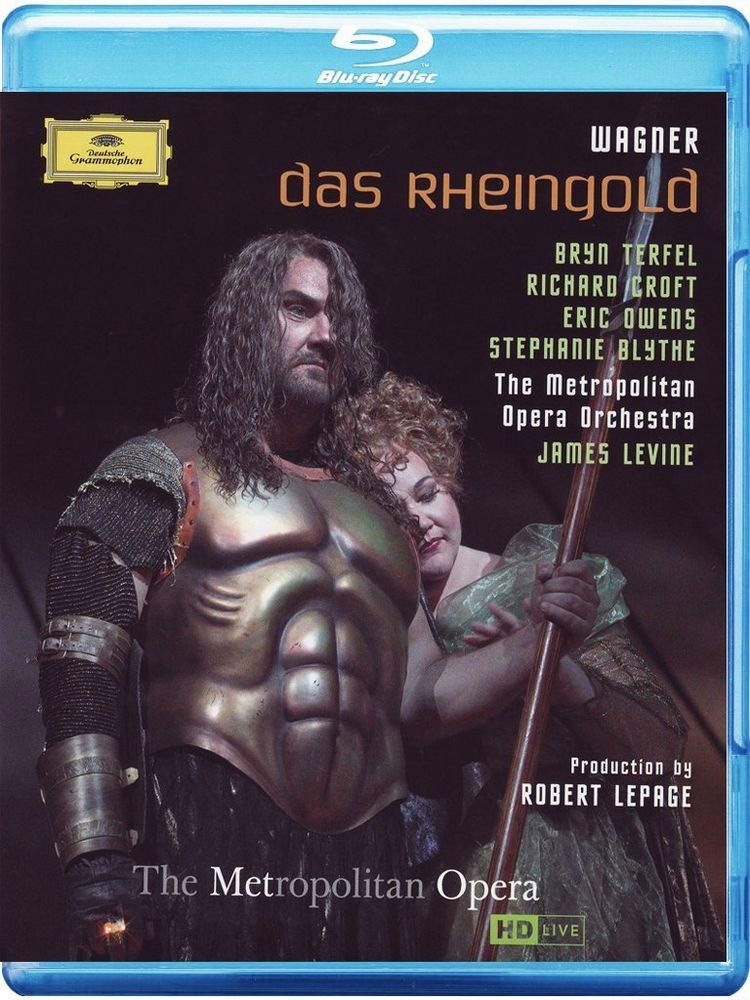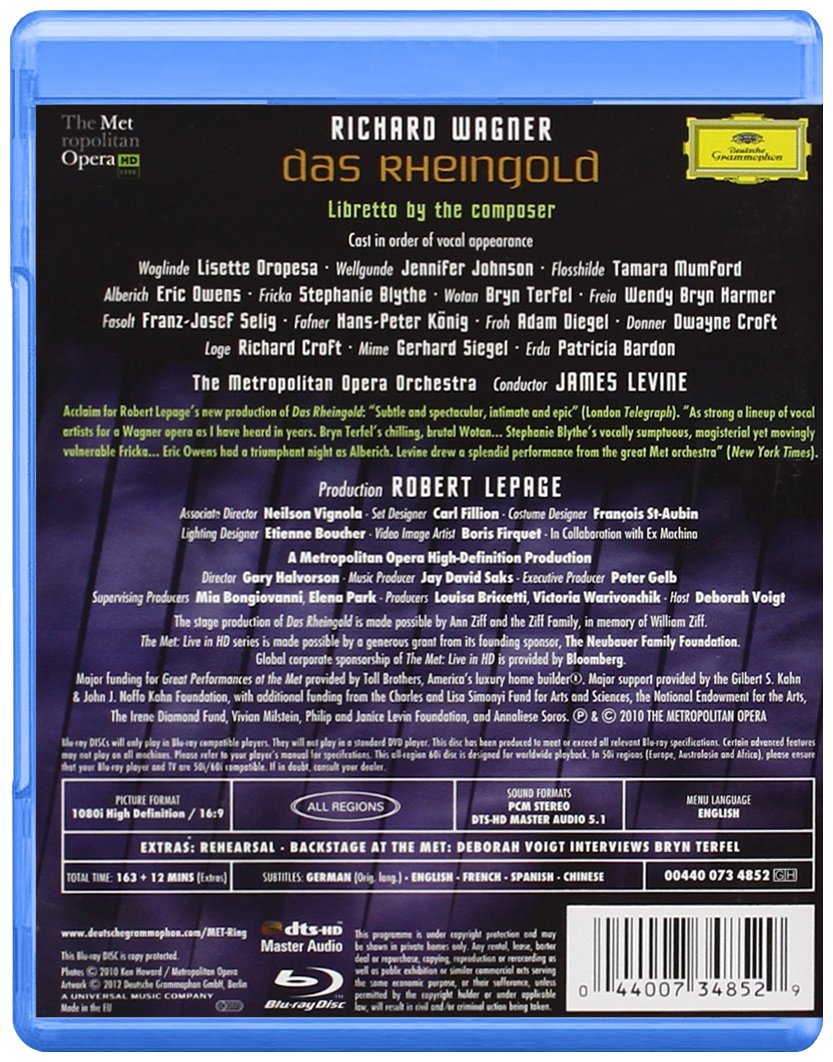

Wagner Das Rheingold. Directed 2010 by Robert Lepage. Stars Lisette Oropesa (Woglinde), Jennifer Johnson (Wellgunde), Tamara Mumford (Flosshilde), Eric Owens (Alberich), Stephanie Blythe (Fricka), Bryn Terfel (Wotan), Wendy Bryn Harmer (Freia), Franz-Josef Selig (Fasalt), Hans-Peter König (Fafner), Adam Diegel (Froh), Dwayne Croft (Donner), Richard Croft (Loge), Gerhard Siegel (Mime), and Patricia Bardon (Erda). James Levine conducts the Metropolitan Opera Orchestra. Associate Direction by Neilson Vignola; set design by Carl Fillion; costume design by François St.-Aubin; lighting design by Etienne Boucher; video image art by Boris Firquet in collaboration with Ex Machina. Directed for TV by Gary Halvorson; music produced by Jay David Saks. Sung in German. Released 2012, disc has 5.1 dts-HD Master Audio sound. Grade: A+
Note that this disc is also available in the Ring des Nibelungen box set published by Deutsche Grammophon. Before you read the mini-review below for Das Rheingold, you might read our write-up for entire Met Ring set.
I've seen criticism in the press of weaknesses in this Met Rheingold recording; but on close reading, I see that the harsh comments come from seeing the live performance or watching it in a movie house. I already explained in my discussion of the Met Ring set why some troublesome aspects of the live show don't bother us in the home theater. Also, you should be wary of relying on any criticism that comes from seeing this Rhinegold in a movie theater. The problems with the motion picture theaters come from the lousy equipment that most of them have. The illumination on the big movie house screen always falls way short of what you get in a small home theater. And along with the stench of popcorn oil, you can expect poor sound, focus problems, and mysterious interruptions in the live feed.
I will testify that the PQ of the Met Rheingold when displayed on my Samsung Series 6+ 6500 Plasma TV and Oppo BDP-93 player is a dream come true, and this from gear that cost roughly $2,500. Stated differently, the video craftsmanship provided by the Met in this Blu-ray disc is impeccable and, to me, beyond criticism or possibility of improvement. The Met folks thought they would get good results selling their HD shows with wireless distribution methods. Maybe this will still work out from them. But they have an absolute winner already in their recent Blu-ray discs offerings. I can only hope there are now enough folks out there to buy these wonderful recent discs from the Met.
There are 4 long scenes in Das Rheingold. (Wagner called Rheingold a "Prologue" to the rest of the Ring, and it doesn't have acts or an intermission). Scene 1 introduces us to the Rhinemaidens and ends when Alberich steals the gold the maidens are supposed to be guarding. After a mysterious orchestra Prelude, we suddenly see three mermaids swimming about in the waters of the Rhein while singing silly songs. You quickly realize they are hanging in the air about 25 feet above the stage from almost invisible cables. Behind them is a broad mass consisting of the plates of "the machine" (which I've described in the Met Ring set) representing the waters of or bottom of the river. When the girls sing, bubbles rise. When they flip their tails or wiggle about on their bottoms, pebbles slide downstream. All the visual effects come, of course, from video projected on the plates. The cameramen give us full-stage shots showing how extraordinary all this is. They also provide plenty of near and close shots showing how beautiful and brave these girls are singing away in thin air with no ground or feet to stand on. And of course, the girls have to also elude the eager grasps of a lecherous gnome hot for action. Alas, after seeing this amazing segment, you will never be happy again with a Rheinmaiden splashing around in a bathtub, even if she is topless. (The Met Rheinmaidens are fully covered with scales.)
I'll mention one other wonderful use of the machine in the segment where Wotan and Loge (the god of fire) travel to the underworld to steal from the gnome the same gold that the gnome stole from the Rheinmaidens. Using clever lighting, a path is created across the stage twice. You see Wotan and Loge walking across the stage on the path. But in fact they are hanging parallel to the opera stage floor and are "walking" on a kind of wall of steps. (And in fact, body-double acrobats are doing this stunt.) When Wotan and Loge enter the second flight of steps, the same plates of the machine, again via lighting, form both the path to be trod and the ceiling of the vault of the underworld below. All of this has the weird realism of dreams, a state that has has often been portrayed well in motion pictures but is a bit too complicated to attempt on an opera stage.
The previous two paragraphs illustrate that when you watch this Rheingold, you are seeing wild stuff that nobody thought of before. But that's not the important thing about this show. As Lepage states in an extra feature, this is an intimate drama about a dysfunctional family. What counts is not wizardry, but old-fashioned craftsmanship in story telling. In the opening of this review, I already (over)praised the video content. Perhaps another reason the video comes across so well is the attention to detail lavished on other aspects of this production by Lepage: intelligent, careful blocking and directions, excellent acting by all, and tasteful costumes add up to a verisimilitude that makes you care about the characters. And because the cameras and mikes take us so close to the action, none of the singers show weaknesses that could be spotted by anyone other than experts. For example, I read a critic who suggested that Richard Croft has too light-weight of a voice to properly sing Loge. Well, maybe this was evident in the live show—but it's not evident at all in the HDVD. Richard sings splendidly in my home theater, and his portrayal has remarkable depth. You feel Loge's frustration when Wotan ignores advice and sticks the magic ring on his finger. And don't miss Loge's last lines in the opera where Wagner himself (I think) makes an editorial comment about the hubris of the "immortal" gods.
Get the Met Ring set and watch this Rhinegold several times to get started. Then you will have all the foundation you need for tracking and enjoying the remaining three operas. Getting control of the allegorical aspects of the Ring cycle may require more homework, but that can wait.